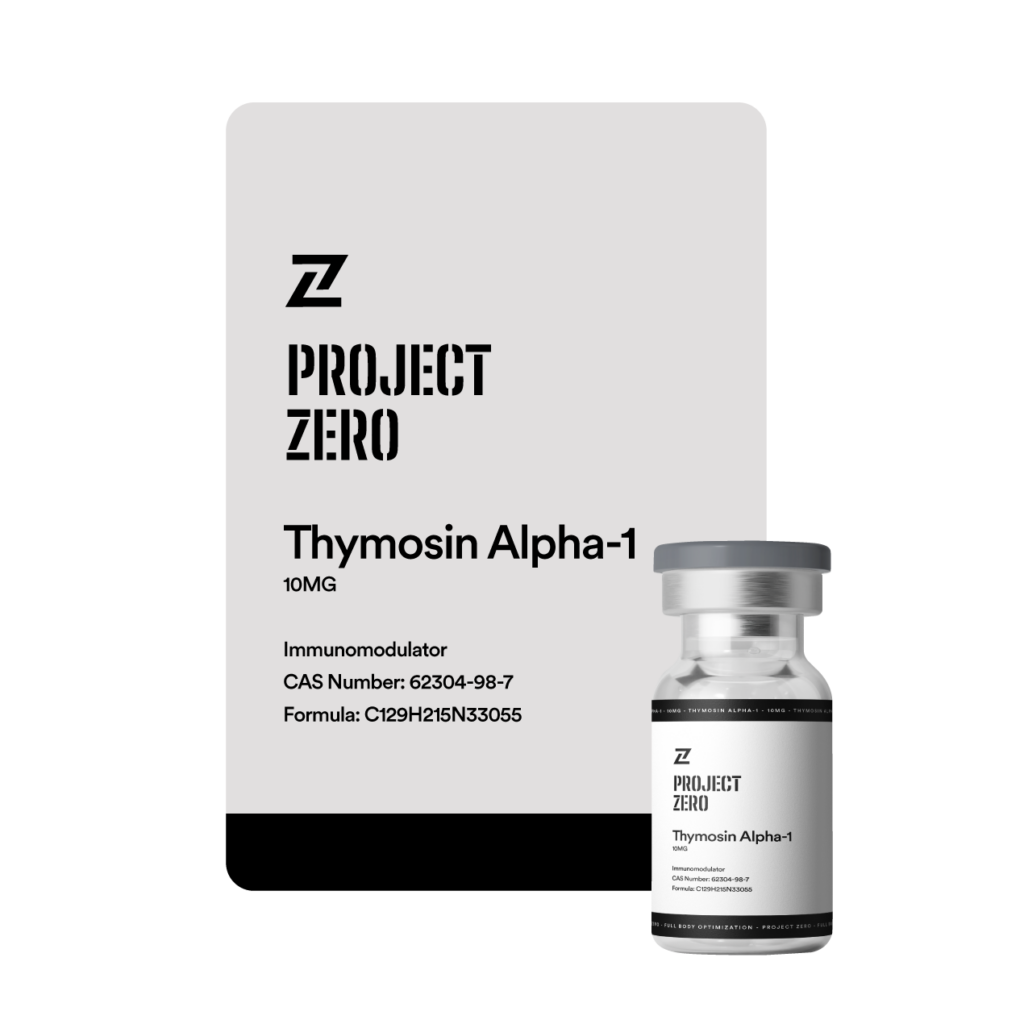Thymosin Alpha-1:
Dosage, Benefits,
and Research Explained
Thymosin Alpha-1 (Tα1) is a naturally occurring 28-amino acid peptide produced in the thymus gland. It plays a crucial role in immune system regulation, enhancing T-cell function, and modulating immune responses. Tα1 has been widely studied for its applications in treating viral infections, cancer, and immune deficiencies. It is also used as an adjunct therapy in sepsis and autoimmune conditions. Synthetic versions, such as Thymalfasin, have been approved in over 35 countries for various clinical applications.
Immunomodulator
CAS Number: 62304-98-7
Formula: C129H215N33055
| Purpose | Dosage | Frequency |
|---|---|---|
| General Use | .8-1.6mg weekly | Once weekly |
| Immunity | 1.6-3.2 mg weekly | Once weekly |
How It Works
Tα1 functions by stimulating T-cell differentiation and activation, improving immune surveillance, and modulating cytokine production. It enhances the body’s natural ability to fight infections and diseases by:
- Increasing the number and activity of helper T-cells and cytotoxic T-cells
- Regulating inflammatory responses by modulating cytokines such as interleukin-2 (IL-2), interleukin-10 (IL-10), and interferon-gamma (IFN-γ)
- Enhancing antibody production to combat infections
- Counteracting the immunosuppressive effects of stress and aging
Research-Backed Benefits
1. Immune System Modulation
Tα1 enhances innate and adaptive immunity, making it beneficial for individuals with compromised immune systems, including those with chronic infections, autoimmune diseases, and cancer.
2. Antiviral Properties
Tα1 has been studied extensively for hepatitis B (HBV) and hepatitis C (HCV) treatment, showing improved viral clearance and liver function. It has also shown potential in treating COVID-19 and HIV by boosting immune defenses.
3. Cancer Therapy Adjunct
Tα1 has been used alongside chemotherapy and immunotherapy to enhance treatment effectiveness and reduce treatment-related immunosuppression in cancers like melanoma, lung cancer, and hepatocellular carcinoma.
4. Sepsis & Critical Care Treatment
Studies suggest that Tα1 can help manage severe infections and sepsis by balancing the immune response, preventing excessive inflammation, and improving survival outcomes.
5. Autoimmune & Inflammatory Disorders
Tα1 plays a role in reducing chronic inflammation in conditions like rheumatoid arthritis, multiple sclerosis, and lupus, by modulating immune activity and suppressing overactive inflammatory responses.
Future Research & Applications
While Tα1 is widely used, ongoing research is focused on:
✔ Expanded applications in autoimmune diseases and chronic infections
✔ Combination therapies with modern cancer immunotherapy drugs
✔ Long-term safety and dosing optimization for broader clinical use
Conclusion
Thymosin Alpha-1 is a powerful immune-boosting peptide with a wide range of clinical applications, from enhancing antiviral defenses to supporting cancer treatments and reducing inflammation. As research continues, Tα1 may become an even more valuable tool for immune regulation and disease management.
Disclaimer
This product is for research and educational purposes only. It is not FDA-approved for medical use, diagnosis, or treatment. Always consult a healthcare professional before use.
What is Thymosin Alpha-1 used for?
Tα1 is primarily used to enhance immune function, support antiviral defenses, modulate inflammatory responses, and as an adjunct therapy in cancer treatment. It has also been explored for treating sepsis, chronic infections, and autoimmune diseases.
Tα1 is primarily used to enhance immune function, support antiviral defenses, modulate inflammatory responses, and as an adjunct therapy in cancer treatment. It has also been explored for treating sepsis, chronic infections, and autoimmune diseases.
It regulates T-cell activity, enhances immune response against infections and cancer, and modulates cytokine levels to balance inflammation.
Is Thymosin Alpha-1 FDA-approved?
Thymalfasin (a synthetic version of Tα1) is approved in over 35 countries for treating hepatitis and immune deficiencies. However, in the U.S., it is not FDA-approved and is used for research purposes only.
How long does it take to see results?
- Immune support: Some people notice benefits within 4-6 weeks.
- Chronic conditions: Long-term therapy (8-16+ weeks) may be necessary for full effects.
- Cancer & severe infections: Effects vary based on individual health status and treatment combinations.
Referenced Citations
- Baralt, D., et al. (2020). “Thymosin alpha 1: A comprehensive review of the literature.” World Journal of Clinical Cases, 8(23), 5821-5832. [Online].
Available: https://www.ncbi.nlm.nih.gov/pmc/articles/PMC7747025/ - Tao, N., et al. (2023). “Thymosin α1 and Its Role in Viral Infectious Diseases: The Mechanism and Clinical Application.” International Journal of Molecular Sciences, 24(8), 7296. [Online].
Available: https://www.ncbi.nlm.nih.gov/pmc/articles/PMC10144173/ - Li, J., et al. (2013). “Thymosin alpha 1: Biological activities, applications and genetic engineering production.” Peptides, 46, 1-8. [Online].
Available: https://www.ncbi.nlm.nih.gov/pmc/articles/PMC7115394/ - Costantini, C., et al. (2019). “A Reappraisal of Thymosin Alpha1 in Cancer Therapy.” Frontiers in Oncology, 9, 873. [Online].
Available: https://www.frontiersin.org/articles/10.3389/fonc.2019.00873/full - ChemicalBook. (2024). “Thymosin α1 | 62304-98-7.” [Online].
Available: https://www.chemicalbook.com/ChemicalProductProperty_EN_CB7678989.htm - Costanzo, M., et al. (2021). “Thymosin α1 for prevention of severe COVID-19 in cancer patients.” Pharmacological Research, 163, 105302. [Online].
Available: https://www.ncbi.nlm.nih.gov/pmc/articles/PMC7874885/
